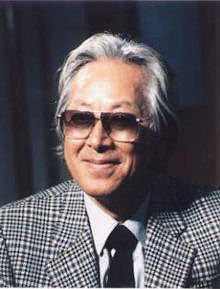Kinji Fukasaku
| Kinji Fukasaku 深作 欣二 |
|
|---|---|
 |
|
| Born |
3 July 1930 Mito, Ibaraki Prefecture, Japan |
| Died | 12 January 2003 (aged 72) Tokyo, Japan |
| Occupation |
Film director Screenwriter |
| Years active | 1961–2003 |
| Spouse(s) | Sanae Nakahara |
| Children | Kenta Fukasaku |
Kinji Fukasaku (深作 欣二 Fukasaku Kinji?, 3 July 1930 – 12 January 2003) was a Japanese film director and screenwriter.
He is known for directing the Japanese portion of the Hollywood film Tora! Tora! Tora! (1970), yakuza films including the seminal Battles Without Honor and Humanity (1973), samurai period pieces such as Shogun's Samurai (1978), and his controversial final film Battle Royale (2000). He was also known for his trademark shaky camera technique, which he used extensively in many of his films from the early 1970s.
In 1997, he received the Purple Medal of Honor from the Japanese government for his work in film.
Kinji Fukasaku was born in 1930 in Mito, Ibaraki Prefecture as the youngest of five children. When he was 15 years old, Fukasaku's class was drafted, and he worked as a munitions worker during World War II. In July 1945, the class was caught in artillery fire. Since the children could not escape artillery fire, they had to dive under each other in order to survive. The surviving members of the class had to dispose of the corpses After the war, he spent much of his time watching foreign films.
Fukasaku studied cinema at Nihon University, in the country's first film department, before switching to the literature department for scriptwriting his junior year. There he studied under Kogo Noda and Katsuhito Inomata. After graduating in 1953, Fukasaku became an assistant director at Toei in June 1954, where he worked under people such as Masahiro Makino and Yasushi Sasaki.
...
Wikipedia
